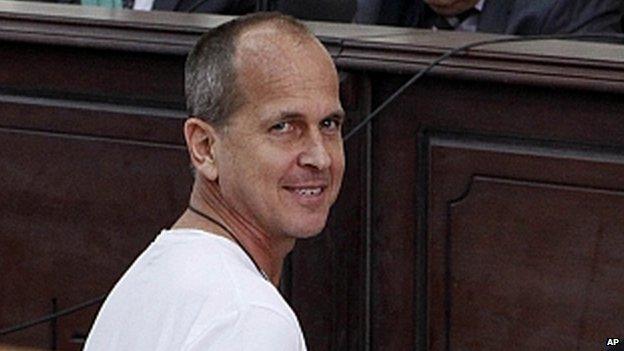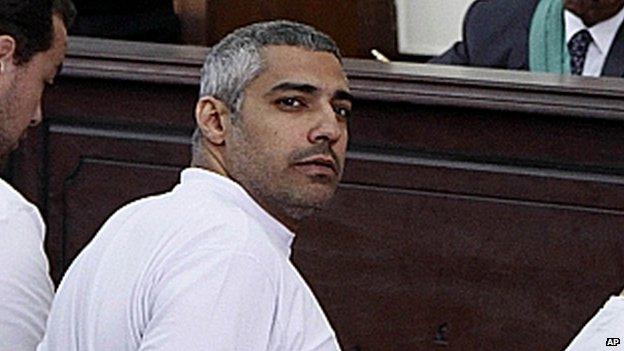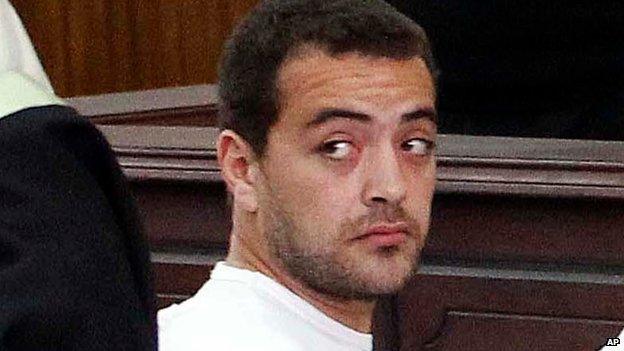Who are the al-Jazeera journalists tried in Egypt?
- Published
Peter Greste (L), Mohamed Fahmy (C) and Baher Mohamed (R) were accused of aiding a terrorist group
The case of the three al-Jazeera journalists given seven-year prison sentences in June 2014 on terrorism-related charges became a major controversy for the Egyptian government.
Australian al-Jazeera English reporter Peter Greste was allowed to leave Egypt for Australia on 1 February, after more than 400 days in prison.
Two of his colleagues - Egyptian-Canadian bureau chief Mohamed Fahmy and Egyptian producer Baher Mohamed - were released almost two weeks later on 13 February and are awaiting a retrial.
All three were earlier convicted of spreading false news and collaborating with the banned Muslim Brotherhood after the overthrow of President Mohammed Morsi in 2013.
According to defence lawyers, prosecutors have acknowledged that there are major problems with the verdicts.
Mr Mohamed had received an additional three-year prison sentence on a separate charge involving possession of weapons.
The defendants deny the charges, describing their trial as a sham.
Peter Greste

Peter Greste has also worked for the BBC and Reuters
Australian journalist Peter Greste, 48, worked for a number of news organisations including Reuters and the BBC before joining al-Jazeera's English news channel.
An experienced correspondent, Mr Greste started out reporting on Bosnia and South Africa, then moved on to cover Afghanistan, Mexico, and the Middle East.
He was the BBC's Kabul correspondent in 1995, where he watched the Taliban emerge, and he returned after the US-led invasion in 2001.
Since 2009 he has been based in Nairobi, Kenya, from where he has covered the Horn of Africa with a particular focus on Somalia. His documentary, Somalia: Land of Anarchy, won a Peabody Award in 2011.
Prior to his conviction, Mr Greste wrote open letters from Cairo's Tora Prison expressing his frustration at being locked up on charges of falsifying news and damaging Egypt's reputation.
"After more than 20 years as a foreign correspondent, I know what is safe ground. And we didn't stray anywhere near that edge," he stressed.
He said the "new normal" in Egypt had shifted so far that routine journalism suddenly appeared threatening.
"How do you accurately and fairly report on Egypt's ongoing political struggle without talking to everyone involved?" he asked.
In his first interview since his release, Mr Greste said that being imprisoned with his two al-Jazeera colleagues had meant he had got to know them intimately. He described Mr Fahmy and Mr Mohamed as his "brothers".
He said that the key to enduring his imprisonment was to stay "physically, mentally and spiritually" fit, and remarked, "hopefully, touch wood, I haven't come out of it too damaged".
Describing the decision to release him as "a really big step forward" for Egypt, Mr Greste said he had been "absolutely overwhelmed" by the campaign to free him and his colleagues, and said the magnitude of this would take some time to fully appreciate.

Mohamed Fahmy

Mohamed Fahmy has reported extensively on events in the Middle East and North Africa
Al-Jazeera English's bureau chief in Cairo, Mohamed Fahmy, 40, was born in Egypt but moved to Canada with his family in the early 1990s.
He has previously reported on events in the Middle East and North Africa for other major news outlets such as CNN and the New York Times.
Mr Fahmy is also the author of Egyptian Freedom Story, an account of the 2011 revolution that led to the fall of the then-President Hosni Mubarak.
In May 2014, the Canadian Committee for World Press Freedom honoured Mr Fahmy with its annual award.
In a letter smuggled out of his prison cell during his trial, Mr Fahmy said: "A key part of our defence has been to convince the judge of our professional integrity; to prove to him that we are journalists striving for the truth; and not agents of terror. This award will go a long way toward making our case."
Prominent figures in Egypt voiced their support for Mr Fahmy. Among them was former Arab League Secretary General Amr Moussa, who wrote to the court saying that he "is known as competent, has integrity and is objective".
Upon leaving prison, Mr Greste described his colleague as, "an extraordinary professional, a very dedicated journalist", and called him a, "very passionate and strong-willed character".
An Egyptian court ordered Mr Fahmy's release on bail on 12 February along with that of his fellow inmate Baher Mohamed, and both left prison the following day with their retrial due to resume later in February.
Mr Fahmy has renounced his Egyptian citizenship, but there has been no official response to his move from the Egyptian authorities.

Baher Mohamed

Baher Mohamed began working for al-Jazeera English in May 2013
Al-Jazeera producer Baher Mohamed, 30, has worked for various international media organisations in Egypt since he graduated from Cairo University in 2005.
He was with Japan's Asahi Shimbun newspaper from 2008 to 2013, and did freelance work for CNN and Iran's English-language Press TV.
Mr Mohamed joined al-Jazeera English in May 2013 and covered the mass opposition protests in Cairo that started on 30 June of that year and led to the ousting of Mr Morsi.
According to transcripts from Mr Mohamed's interrogations by the prosecution, published in Egypt's state-run newspaper al-Ahram, he said his father was a member of the Muslim Brotherhood and had tried to make him go to religious classes organised by the Islamist movement.
But Mr Mohamed was quoted as saying that he had refused to attend because they were "boring".
Peter Greste described Mr Mohamed as, "one of the most extraordinary family men I've ever met", and said he had probably suffered more than any of his colleagues whilst in prison, particularly because one of his three children had been born since his conviction.
Mr Mohammed left prison on 13 February, a day after a court had decided that he and Mr Fahmy should be free during their retrial which is due resume later in February.
BBC Monitoring, external reports and analyses news from TV, radio, web and print media around the world. You can follow BBC Monitoring on Twitter , externaland Facebook, external.